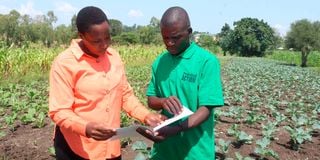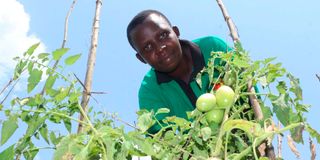Premium
Leasing document promotes agribusiness in Homa Bay

Practical Action Project Officer Linda Owako reviews a land leasing document with Brian Otieno in Wahambal Village, Homa Bay County.
What you need to know:
- Susan Owuor has been leasing land to grow tomatoes and traditional vegetables for years.
- Fifteen kilometres away in Radiro village, Beatrice Kamala had problems with leasing.
Farmers in Homa Bay have a reason to smile after the Department of Agriculture and Practical Action – an NGO – developed a document that allows one to sue a landowner who breaches a lease agreement.
In Karian village, Susan Owuor has been leasing land to grow tomatoes and traditional vegetables for years. She says buying land is expensive.
“Agriculture is my main source of income. I have no land so leasing is the only way to go,” the 33-year-old says.
Until recently, she faced many challenges when leasing land.
“After paying the initial amount, some landowners would ask for sexual favours to cover the remaining amount. It is one of the factors stopping women from being agripreneurs,” she says.
Some opted for another system locally called pur wabar, were one leases land and shares the yields with the landowner.
The farmer uses half of the field, with the remaining yields taken by the owner. Owuor says whoever hires the land does all work, including wedding, fertiliser application and pest control.
“These farm practices act as payment to the landowner. It is a form of exploitation because the landlord does nothing but gets half of the harvests,” she says.
She has started realising profits after getting the leasing document in January.
Fifteen kilometres away in Radiro village, Beatrice Kamala had problems with leasing. She says the few women with land would face other challenges like boundary disputes.
“Some people deliberately send their animals to graze on land owned by a woman,” she says.
She parts with Sh8,000 to lease an acre for a year. Kamala grows tomatoes and groundnuts.
“Agriculture in Kenya will be a huge industry if women have land,” she says, adding that she acquired a leasing document.
Young men also have landownership difficulties. Some people are not ready to surrender land to their children.
Brian Otieno, a resident of Wahamba village, has not been given land by his father. He says many young people are knowledgeable in agriculture but lack land.
Otieno, 25, started leasing land but encountered many difficulties. Some landowners would change their mind even before his crops matured.
“I now comfortably grow spinach and sukuma wiki. Just before harvest, some landowners would ask for more money when they realised that I would make good profit,” he says, adding that the leases would not be renewed.
Informal agreements are not legally binding or enforceable. Practical Action noticed the problem and sought a solution.
Ms Linda Owako, Practical Action’s Project Officer, says the new land leasing system has unlocked opportunities for women and youth.
Owako says the document provides protection for both parties, making leasing secure.

Beatrice Kamala at her tomato farm Radiro village, Homa Bay County.
“Young agripreneurs are using the document to lease land with confidence,” she says, adding that the document can be accessed at a chief’s office for free. The lease document also comes with the search number for the land to be let.
The eight-page document provides information about the amount paid to a landowner, the crops to be grown, landlord consent, among other information.
Up to seven witnesses sign the paper, three from the landlord’s side, three from the one leasing and the chief.
The individual leasing the land and the landowner are given copies of the document. One is free to involve a lawyer in the process.
Owako says embracing the idea will boost investments in agriculture and create opportunities for young people in agribusiness.
One can lease land for up to three years as opposed to informal deals that limit the period to six to 12 months.
Practical Action supports young people access knowledge, capital, markets, inputs and land.
Owako says awareness of the new leasing system is still low.
“Practical Action is raising awareness about it through grassroots meetings,” she says.
Homa Bay County Agribusiness Deputy Director, Halorine Otieno, says many young people have developed interest in agriculture after the document was developed.
“It is now easy to engage in agriculture, knowing that your venture is protected,” she says.





